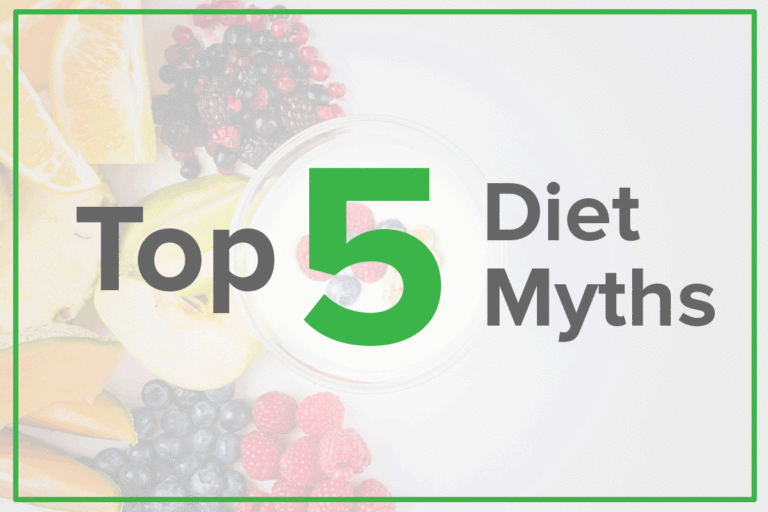In today’s world of endless health advice, flashy diet trends, and instant weight-loss promises, it’s easy to fall prey to misinformation. Many dieting myths circulate so widely that they’re often accepted as truth. But what if some of the most popular beliefs about diets are flat-out wrong—and even harmful?
Here, we uncover the top 5 diet myths that rarely get challenged, but absolutely should. Understanding these myths can lead you to better choices, improved health, and lasting results

Myth #1: Carbohydrates Are the Enemy
One of the most persistent myths in the dieting world is that carbohydrates make you fat. Low-carb diets like keto and Atkins have popularized the idea that cutting carbs is the only way to lose weight. But here’s the truth: carbohydrates are not your enemy—especially when chosen wisely.
The Truth:
Carbohydrates are the body’s primary energy source. Complex carbs—found in foods like brown rice, oats, quinoa, lentils, vegetables, and fruits—are loaded with fiber, vitamins, and minerals that support digestion, brain function, and energy levels.
The Problem:
Highly processed and refined carbs (white bread, pastries, sugary snacks) are the real issue. These spike your blood sugar and provide little nutritional value. But lumping all carbs into one bad category ignores the important role of healthy carbs in a balanced diet.
Myth #2: Eating Fat Makes You Fat
The “low-fat” craze of the 90s convinced millions that eating fat automatically leads to weight gain. Even today, many people still fear dietary fat. But science has long since proven that this belief is both outdated and misleading.
The Truth:
Healthy fats are essential for hormone regulation, brain function, cell health, and vitamin absorption. Sources like avocados, olive oil, nuts, seeds, and fatty fish contain monounsaturated and polyunsaturated fats that actually support heart health and weight management.
The Problem:
Blaming all fats for weight gain has led many to opt for “low-fat” or “fat-free” processed foods—which are often loaded with sugar, artificial flavors, and preservatives to compensate for the missing fat.
Myth #3: You Must Eat Every 2-3 Hours to Boost Metabolism
This myth claims that eating small, frequent meals throughout the day keeps your metabolism “fired up.” While it may sound logical, it’s not supported by solid science.
The Truth:
Meal frequency has little to no effect on your metabolic rate. What matters more is your total caloric intake and food quality over the course of the day. Intermittent fasting and eating fewer meals has even been shown to aid weight loss for some people—without harming metabolism.
The Problem:
Eating constantly can lead to overconsumption of calories, especially if you’re not truly hungry. It also promotes emotional or habitual snacking rather than mindful eating.
Myth #4: Dieting Is the Only Way to Lose Weight
Perhaps the most dangerous and hidden myth is the belief that dieting equals weight loss. Restrictive diets often promise quick results, but they rarely produce sustainable outcomes.
The Truth:
While restrictive diets may work in the short term, they’re often difficult to maintain, leading to yo-yo dieting, metabolic slowdown, and emotional stress around food. Sustainable weight loss comes from creating long-term habits—not temporary fixes.
The Problem:
Dieting promotes a scarcity mindset, making you feel deprived. It encourages guilt, obsession with food, and an unhealthy relationship with eating. Plus, your body often adapts by slowing metabolism, making future weight loss harder.
Myth #5: “Healthy” Packaged Foods Are Always Good for You
Walk through any grocery store, and you’ll see labels like “low-fat,” “gluten-free,” “high-protein,” and “organic” plastered across thousands of processed products. Many believe that if the label says it’s healthy, it must be—but that’s far from the truth.
The Truth:
Marketing can be deceptive. A product labeled as “gluten-free” may still be packed with sugar. A protein bar may contain more additives than a candy bar. “Low-fat” often means high in sugar or salt.
The Problem:
Relying too much on packaged foods—even those marketed as healthy—can lead to hidden sugar, sodium, and chemical intake, which may stall your weight loss or cause other health issues.
Conclusion
Diet myths thrive because they offer easy answers to complex health questions. But falling for them can sabotage your efforts, cause frustration, and even damage your physical and mental well-being.
Let’s recap the truth behind the myths:
- Carbs are not the enemy – Just avoid refined carbs.
- Fats don’t make you fat – Healthy fats are essential.
- Meal frequency isn’t everything – Focus on quality, not quantity.
- Diets don’t work long-term – Sustainable habits do.
- Labels lie – Whole foods > packaged “healthy” foods.
By understanding and challenging these hidden myths, you empower yourself to make smarter, more sustainable choices. Instead of chasing fads, focus on building a balanced lifestyle that supports your health goals.